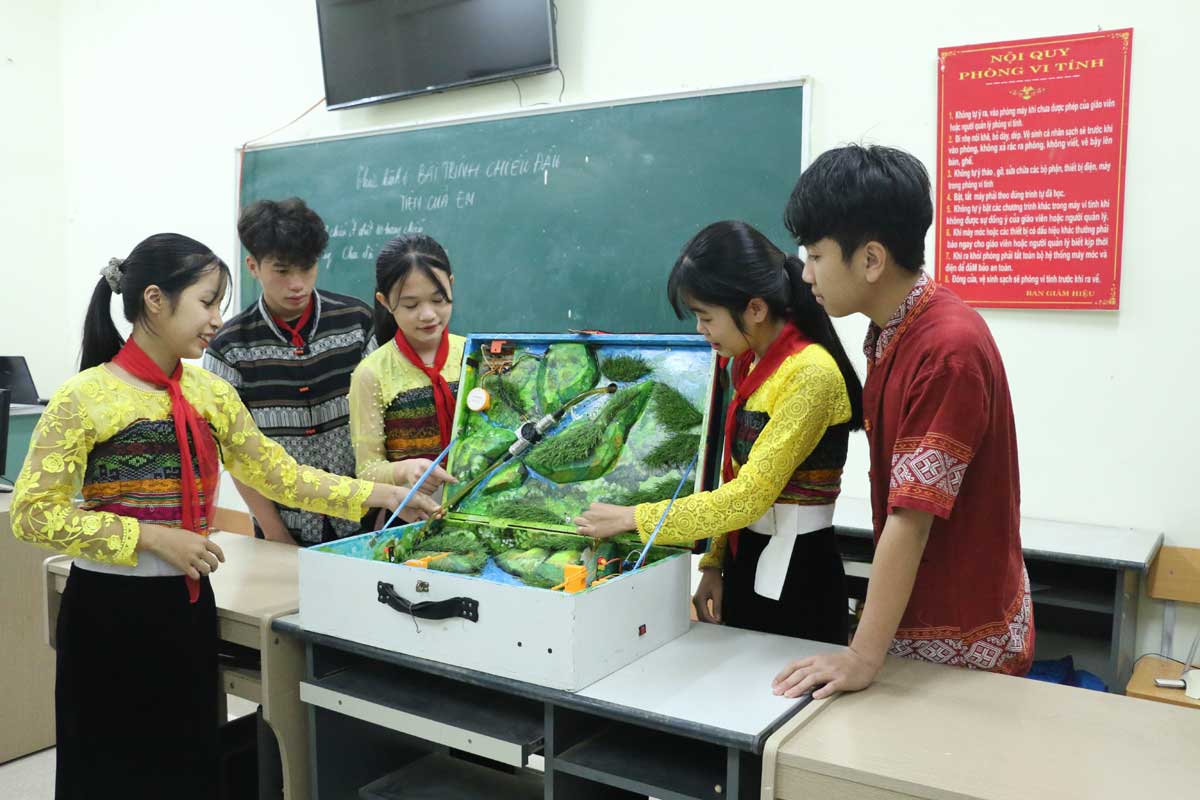
(HBO) – A project on flood and landslide warning developed by a group of Thai ethnic minority students from Hoa Binh won the second prize at an exchange event of programming clubs nationwide hosted by the Dariu Foundation in the Central Highlands province of Lam Dong. The pupils are from the Na Phon primary and secondary school in Mai Chau district’s Na Phon commune.
 A project on flood and landslide
warning by a group of Hoa Binh students from the Na Phon primary and secondary
school wins the second prize at an exchange event of programming clubs
nationwide hosted by the Dariu Foundation.
A project on flood and landslide
warning by a group of Hoa Binh students from the Na Phon primary and secondary
school wins the second prize at an exchange event of programming clubs
nationwide hosted by the Dariu Foundation.
According
to ninth grader Ha Thi Thu Huong, a member of the group, the transport system
in mountainous Na Phon commune include special bridges crossing streams, which
are often hit by unexpected floods during the rainy season.
Unexpected
floods and landslides have caused accidents and damage to both people and their
vehicles, she said.
"From
the fact and with support from our teachers, we came up with the idea and worked
to translate it into reality in hope of reducing damage caused by natural
disasters in mountainous areas,” Huong noted.
When
it is raining hard, a flood is quick to form on a stream. It is also very
difficult to predict when the flood hits the bridge crossing it. Therefore, the
pupils built a flood warning model, which places a flow sensor about 2km away
from these risky bridges.
Ha
Manh Hung, another member of the group, said the sensor will send signals to a
microprocessor that turns on lights of different colours – green for normal
passing, yellow for restricted passing, and red for stop. When the red light is
turned on, a bar will be pulled down. The system uses solar energy and rechargeable
batteries.
Based
on the same principles, the group studied to put sensors at areas with a high
risk of landslides. When the danger is near, the system will send signals via
lights or loudspeakers to alert nearby residents.
During
their implementation of the project, the pupils faced myriad difficulties. They
are all from an ethnic minority and disadvantaged backgrounds. Owning no
computers at home, they had to carry out all of their researches at school.
They also encountered challenges purchasing needed equipment.
Their
success despite difficulties will contribute to encouraging local students,
particularly ethnic minorities, to engage in scientific and technological
research and innovation./.
Mai Chau district has firmly established itself as a standout destination on Vietnam’s tourism map, attracting both domestic and international visitors with its breathtaking landscapes, rich ethnic culture, and warm hospitality. However, beyond its natural and cultural charm, a secure and well-managed tourism environment has added to Mai Chau’s appeal.
As Vietnam enters a new phase of economic and administrative reform in 2025, Hoa Binh province is stepping up its efforts to streamline governance, boost economic growth, and attract investment.
The Hoa Binh provincial People's Committee held its monthly meeting on March 26 to review the progress of key projects, assess budget revenue and public investment disbursement, provide feedback on draft documents for submission to the provincial Party Committee's Standing Board, and discuss other important matters related to the committee's governance activities.
Playing a key role in Hoa Binh province’s economic development, Luong Son district has been focusing on science and technology development, innovation, and digital transformation.
Identifying the application of online public services as a key step in administrative procedure reform and e-government building, Kim Boi district has proactively provided services and supported residents and businesses in accessing and utilising full-process online public services promptly and efficiently. The locality aims to lift the rate of end-to-end online public services to over 90%, with all officials and civil servants handling tasks in the digital environment.
Nguyen Anh Tuyet, hailing from a family steeped in the ancient art of herbal medicine, is transforming local medicinal herbs into high-value concentrated extracts, elevating their worth and healing potential.



 A project on flood and landslide
warning by a group of Hoa Binh students from the Na Phon primary and secondary
school wins the second prize at an exchange event of programming clubs
nationwide hosted by the Dariu Foundation.
A project on flood and landslide
warning by a group of Hoa Binh students from the Na Phon primary and secondary
school wins the second prize at an exchange event of programming clubs
nationwide hosted by the Dariu Foundation.